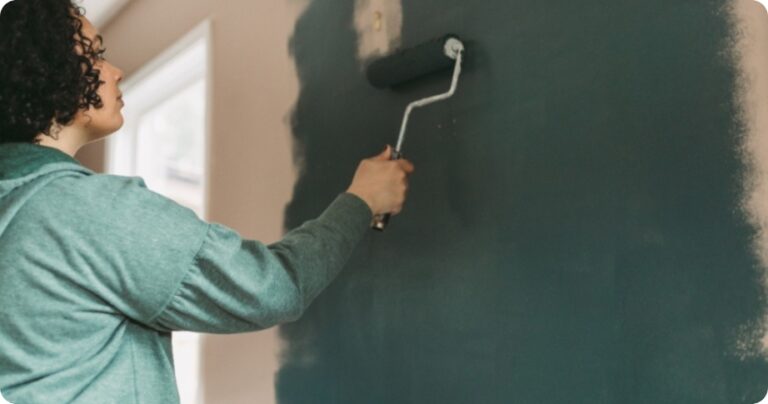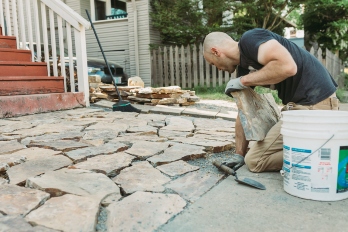So … you found a contractor!
Their credentials check out, their references gave glowing reviews, their licenses and insurance are up to date … time to get that project rolling!
Hold up: Before the saws start spinning, there are a few things you may want to hammer out with your pro.
(Also, if you haven’t found a contractor yet and could use some tips, we explain how to hire a general contractor. 🛠)
The work contract drawn up should cover most of issues included below, but it’s still helpful to have a chat with your contractor after you review all the paperwork. If these details aren’t included, consider getting them in writing.
The bottom line is this: Good communication makes good working relationships.
Here’s a quick roundup of things to go over with your contractor so you’re on the same page:
The project
Clarify exactly what the project entails. Contractors often provide a “scope of work,” which is a written document describing exactly what work the contractor will do.
When it comes to the scope of work, the more details, the better. For example, “finish living room walls” leaves a lot of room for interpretation. Does “finish” mean put up dry wall? Or does it mean drywall, mud, tape, and paint? If you have questions about exactly what something means, ask right away and feel free to get the answers in writing.
Meanwhile, talk to your contractor about how changes will be handled, since it’s common for things to come up during a project. Even if a change doesn’t have associated costs, a “change order” can help track progress and make sure everything is documented (more on change orders in “The cost and payment” section).
The timeline
Your contractor should include a project timeline with your contract. This is especially important for larger, more complex projects. The timeline isn’t simply a deadline at the end of the project, it offers a series of dates when particular portions of the project will be complete. Often, it’s represented visually in a graph.
Plan for the project timeline to change. This is totally normal. Weather, material availability, sub-contractor schedules, and delays in permits can all delay a project. The more complex the project, the more potential delays.
Before beginning the work, ask your contractor about how they handle delays. Will they update the timeline? How will they will keep you in the loop? As the project goes on, feel free to ask why something is taking longer than expected.
That said, be patient with your contractor. They want to finish the job just as badly as you do!
By the way … if you’re nervous about having pros come into your home, we have tips to safely hire a contractor during COVID-19.
The costs and payment
Contractors use a variety of contracts. Time and materials, lump sum, cost-plus, and unit price contracts are all common. Each one uses different criteria to determine the final figure.
Be sure to understand how your contractor determined the cost for your specific project and be clear about your budget and ask how costs may change. Pause if you’re confused or aren’t comfortable with something.
Another good idea is to ask your contractor how they handle change orders. A change order is a document that tracks changes made to the original project in terms of work completed and the associated costs. Talking through the change order process can help you understand the process and give you flexibility to make adjustments if you choose.
Additionally, make note of your payment deadlines and ask your contractor how they prefer to be paid. Before making payments, refer to the project timeline to make sure your contractor is pulling their end of the bargain.
The expectations
Don’t make your contractor guess what you want. Just tell them; they’ll appreciate the clarity. For example, where should they park? What bathrooms can they use? How should they lock up at the end of the day? What are their typical work hours?
Asking questions related to your concerns allows the contractor to explain their usual practices and gives you a chance to chime in if you need anything different.
The communication
Collect phone numbers and email addresses from your contractor and any other major players, including electricians, plumbers, or anyone else doing work on your home. Likewise, everyone should also have your contact info and a contact for the next-in-charge, whether that be a family member, a friend, or a trusted neighbor.
Establish a communication plan. How will information about your project be communicated to you? Do you want to have a quick daily call, a weekly briefing, or do you only want to know what’s going on if there’s an issue?
Make sure any major decisions communicated verbally are documented in writing. After any important conversation, consider asking your contractor to send you an email or a text message outlining what was covered and agreed upon during the meeting.
The trust
Once you’ve nailed everything down, let your contractor get to work! Like any employee, they’ll appreciate the trust and space to get the job done.
However, keep in mind that it’s OK to call a time-out at any point in the process. It’s your contractor’s job to answer your questions and address your concerns along the way!
Need some more help with home maintenance? Check out these posts:
- Five easy ways to keep up with kitchen maintenance.
- Home maintenance for dummies – upkeep tasks any homeowner can handle. 💪




